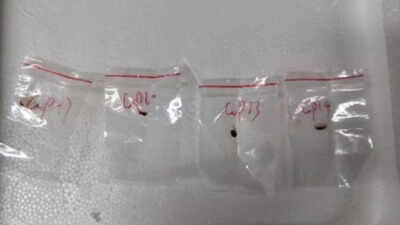ARTICLE AD BOX

Two Chinese nationals are facing serious federal charges after allegedly smuggling a destructive crop fungus into the United States. Yunqing Jian, 33, and Zunyong Liu, 34, were arrested in connection with a case that federal prosecutors say raises critical concerns about national security and food safety.According to a criminal complaint filed in the U.S. District Court in Detroit, the two scientists have been charged with conspiracy, smuggling goods into the United States, false statements, and visa fraud. Prosecutors allege that the pair "illegally imported" Fusarium graminearum, a crop-infecting fungus known to cause head blight—a disease that targets key grains like wheat, barley, maize, and rice.
“This case involves a fungus that poses a serious risk to global food security and public health,” said Jerome F.
Gorgon, Jr., United States Attorney for the Eastern District of Michigan. “The alleged smuggling of this biological agent into an American research institution by foreign nationals is a matter of grave national security concern.”
Who are Yunqing Jian and Zunyong Liu?
According to the U.S. Attorney’s Office, Eastern District of Michigan, “The FBI arrested Jian in connection with allegations related to Jian’s and Liu’s smuggling into America a fungus called Fusarium graminearum, which scientific literature classifies as a potential agroterrorism weapon.”
The complaint reveals that Jian and Liu have been in a romantic relationship since July 2024, the same month Liu arrived in the United States, allegedly carrying small bags of the crop-damaging fungus. Liu later told investigators he intended to use the samples for research at the University of Michigan, where Jian was employed as a visiting research fellow.
Jian, whose academic focus is molecular, cellular, and developmental biology, reportedly received Chinese government funding to support her work involving Fusarium graminearum.
Her partner, Liu, conducts similar research in China.When initially questioned at Detroit Metropolitan Airport in July 2024, Liu claimed he had no knowledge of the fungus in his luggage. He later admitted to the FBI that he had brought the samples into the country for scientific research purposes.
What is Fusarium graminearum?
Fusarium graminearum is a fungus that causes Fusarium head blight, a serious disease affecting cereal crops like wheat, barley, maize, and rice.
In the U.S. alone, it’s responsible for around $1 billion in crop losses every year, according to the Department of Agriculture.

While other fungi can cause the same disease, Fusarium graminearum is the most common one in the U.S. It infects crops early in the season, damaging grain heads and turning them a pale, whitish color. It also produces a toxin in the grains that’s harmful to both people and animals.This toxin, often called vomitoxin, can cause vomiting in livestock and symptoms like diarrhea, abdominal pain, headache, and fever in both animals and humans.
Because of this, grain crops are carefully tested before they’re used for food or animal feed. If the fungus is found, the crops must be discarded—causing heavy losses for farmers.It’s not unusual for researchers to import foreign plants, animals, or fungi to study how they behave in different conditions. However, doing so legally requires specific permits. For example, scientists might study a foreign strain of this fungus to understand how it survives heat, resists fungicides, or evolves over time. What remains unclear is why the researchers wanted to bring this particular strain of Fusarium graminearum into the U.S.
, and why they didn’t follow the legal steps to do so.



.png)
.png)
.png)
















 1 day ago
4
1 day ago
4









 English (US) ·
English (US) ·